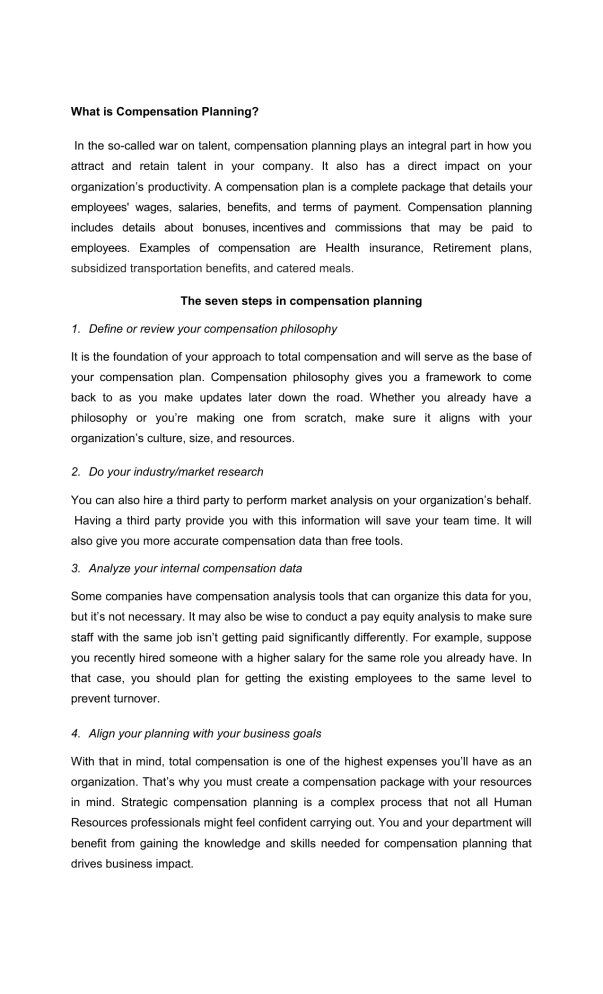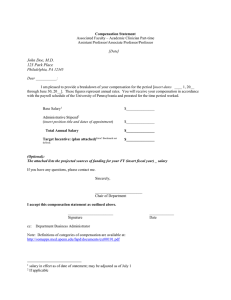Compensation Planning: A Guide to Attracting and Retaining Talent
advertisement

What is Compensation Planning? In the so-called war on talent, compensation planning plays an integral part in how you attract and retain talent in your company. It also has a direct impact on your organization’s productivity. A compensation plan is a complete package that details your employees' wages, salaries, benefits, and terms of payment. Compensation planning includes details about bonuses, incentives and commissions that may be paid to employees. Examples of compensation are Health insurance, Retirement plans, subsidized transportation benefits, and catered meals. The seven steps in compensation planning 1. Define or review your compensation philosophy It is the foundation of your approach to total compensation and will serve as the base of your compensation plan. Compensation philosophy gives you a framework to come back to as you make updates later down the road. Whether you already have a philosophy or you’re making one from scratch, make sure it aligns with your organization’s culture, size, and resources. 2. Do your industry/market research You can also hire a third party to perform market analysis on your organization’s behalf. Having a third party provide you with this information will save your team time. It will also give you more accurate compensation data than free tools. 3. Analyze your internal compensation data Some companies have compensation analysis tools that can organize this data for you, but it’s not necessary. It may also be wise to conduct a pay equity analysis to make sure staff with the same job isn’t getting paid significantly differently. For example, suppose you recently hired someone with a higher salary for the same role you already have. In that case, you should plan for getting the existing employees to the same level to prevent turnover. 4. Align your planning with your business goals With that in mind, total compensation is one of the highest expenses you’ll have as an organization. That’s why you must create a compensation package with your resources in mind. Strategic compensation planning is a complex process that not all Human Resources professionals might feel confident carrying out. You and your department will benefit from gaining the knowledge and skills needed for compensation planning that drives business impact. 5. Start creating salary ranges and grades Determining salary ranges helps achieve that. Start with the mission-critical roles or positions where you have many employees. If you already have salary ranges in place, review them to determine what improvements your team can make. Within the salary range, you’ll want to add salary grades. A salary grade scale is a pay format where employees are placed within a pay level based on their experiences. For example, you hire two HR managers with the same title and responsibilities, but one candidate has five years more experience. You would pay the more experienced candidate more, and salary grades help classify why you’d pay someone with the same job title more than another. 6. Manage your compensation budget From that point, you can see if you are overspending or underspending in certain areas. If you have a small team, you can manually track the salaries and compensation in an Excel sheet. However, many dedicated compensation management tools will not only track your employees’ salaries, bonuses, and benefits, but they will also be able to deliver real-time data in an easy-to-use dashboard. 7. Monitor the planning execution and make adjustments Make sure to get feedback from company stakeholders such as managers, employees, or even applicants so that you know you can offer a competitive total compensation package. Compensation planning is a complex process that balances a company’s financial interests and operating goals while attracting, retaining, growing, and rewarding its employees. While it seems like a lot of work for your HR team, in the long run, it helps you ensure that your organization is creating a system that is legal, fair, and competitive within your industry.



